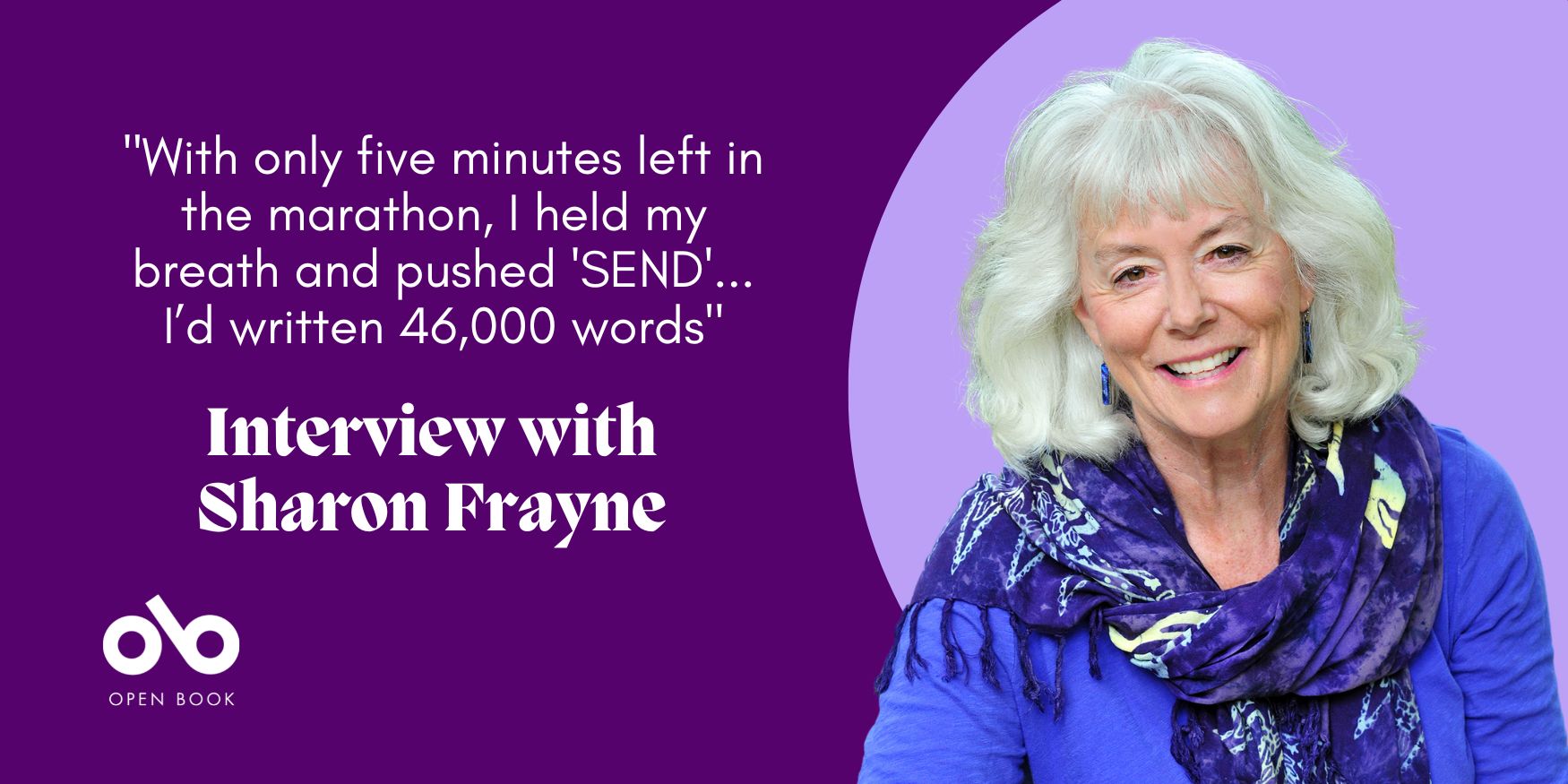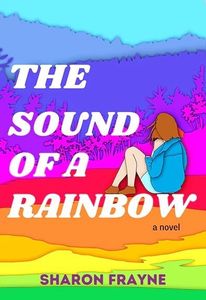Sharon Frayne on Exploring the Power of Disconnecting in Her Marathon-Competition Winning YA Debut
The story of how Sharon Frayne's debut young adult novel The Sound of a Rainbow (Latitude 46 Publishing) came to be is almost as remarkable as the story within the pages. Frayne captured first place in the 2020 edition of the 72-hour Muskoka Novel Marathon, which meant she literally sat and wrote for a nearly hallucination-inducing three day period with only quick cat naps to get her through. That impressive feat changed everything for Frayne, a lifelong book lover and retired principal. Her manuscript was snapped up by Northern Ontario press Latitude 46 Publishing and the story of Raven, her teen protagonist, was brought to readers across the country.
When the novel opens, Raven is hurt and angry. Not only did her long-practiced talent show entry go disastrously wrong, but someone shared a video of it online. The clip went viral and Raven is being tormented by trolls. Her parents pack her off to Rainbow Wings, an inclusive summer camp that welcomes neurodivergent and disabled teens that is totally offline. At first, Raven wants nothing more than the hide from the world, but as she meets the campers and leaders at Rainbow Wings and explores the natural beauty of the camp's setting, she begins to find a world—away from the internet—where she can be herself and maybe even find a way to support her new friends. When her fledging growth is tested, readers will root for Raven to find her strength.
An authentic and captivating read, The Sound of a Rainbow is timely and smart. We're excited to talk to Sharon about the novel today as part of our Bright Young Things young adult interview series. She tells us about the support that made her marathon writing stint—over 40,000 words in three days!—possible, harmful misconceptions about writing for teens and young adults, and the books that are closest to her heart (including her all-time favourite, featuring a beloved and iconic Canadian character).
Open Book:
Tell us about your new book and how it came to be.
Sharon Frayne:
I wrote the entire first draft of The Sound of a Rainbow during the 72-hour Muskoka Novel Marathon in 2020. It won first place in the competition, and was sent to Latitude 46 Publishing for consideration.
The setting is an inclusive and diverse summer camp for the performing arts, and many of the teenage campers and older staff have learning challenges or physical disabilities. Raven, the lead character, is a failed pop singer who has been destroyed by social media after her terrible performance in a talent show went viral. On the advice of a therapist, her divorcing parents send her to Rainbow Wings Camp on a remote island with no internet access. Despite the charms of quirky staff members and the beautiful natural environment, Raven struggles with depression and anxiety and can’t form healthy relationships with others. She continually plots to run away. When she meets Ash, a younger boy with autism, she begins to develop empathy and regain her self-confidence. Their relationship leads to dangerous choices that affect others, and the camp. But sometimes, the challenges we resist the most, can give us the strength to transform into the person we want to be.
The choice of theme and characters comes from a personal place. As a teacher, I worked with many disabled students and their families. I was a high school Head of Arts, taught Visual Art, played keyboards in the school band (badly), and helped in school musicals and performances. I’ve spent many summers at camp, lived in remote Northern Ontario, swatted mosquitoes and tried to avoid bears. I appreciate the healing power of the Arts and natural environment. I wanted to tell a story that honoured people with disabilities... to recognize that when needs are met and nourished, everyone’s potential soars.
OB:
What was the strangest or most memorable moment or experience during the writing process for you?
SR:
For the writing marathon, I had to stay (mostly) awake for 72 hours, and create a satisfying story without too many distracting errors, then submit it to the judges. We were allowed to bring in one piece of paper with notes, but the entire manuscript had to be written within the time limit.
In order to prepare, I brainstormed, day-dreamed, and researched the concept, characters, and plot in advance, and pre-planned as much as I could. Much like studying for a school exam, I crammed it all into my memory! But after the first hour of the marathon, when the sun set and the stars came out, the plot and characters took off on their own. I had to type fast and hard throughout the following hours to keep up.
Your CanLit News
Subscribe to Open Book’s newsletter to get local book events, literary content, writing tips, and more in your inbox
My fantastic husband made my meals, and took care of the dog so I could stay at my desk and keep writing (dressed in pajamas all day). On the last day, he had to travel and left me alone with some pre-prepared food. I wrote and wrote, obsessed with completing the story. As I neared the end, my stomach twisted with tension. Could I make it to the finish? With only five minutes left in the marathon, I did a quick Spell Check, held my breath, and pushed ‘SEND’ to the judges. I’d written 46,000 words. Exhausted and disoriented, I stumbled to my feet. My wrists were painfully swollen, and my fingers ached. Then, I realized I hadn’t eaten for 12 hours! For the next two days, I slept. Of course, after the judges picked my story for the win, I spent many, many hours editing. But the main story came during that dramatic, and intense writing marathon.
Writing in that pressurized environment kept me focused, and kept the writing tight. The stress I felt while churning out the words, translated into the novel’s dramatic tension. Every once in a while, I needed a little humour to lighten the mood, and my characters wanted to have fun, too. There’s plenty of time at summer camp to appreciate the simple things in life, and the beauty of nature. And of course, there’s always good food! Every time my characters ate, I tried to have a snack. I made sure there were lots of cafeteria dining opportunities, and naturally included a campfire and marshmallow roast.
OB:
What do you need in order to write – in terms of space, food, rituals, writing instruments?
SF:
Mostly, I need a quiet, private space, a flat surface for my computer and notebook, and a window to look out. Natural light and a sky view helps. Thanks to years of piano lessons, my typing skills are fast! I use a big monitor, and my iPad and phone are handy for research. My writing starts at 9:00 AM and typically, I finish at noon. A caramel latte at 10:30 AM with a chocolate-chip cookie keep me going! LOL. During the rest of the day, I take long walks, often with my dog, and daydream about the book, mentally problem-solving tricky bits, and collecting details and descriptions. Like a musical ear worm, the book I’m working on is always in the back of my mind, percolating and developing. My solitary writing time is balanced with memberships in a book club, and two writing clubs. I’m always taking writing courses, and learning from other authors.
OB:
Do you feel like there are any misconceptions about writing for teens and young adults? What do you wish people knew about what you do?
SR:
A terrible misconception is that writing for young adults is somehow ‘less’ than writing for adults. It’s not. A great YA novel can crossover into adult genres. I wish people understood that well-written YA novels tap into powerful emotions and situations with universal messages. Young people are bombarded with difficult problems, conflicts and important decisions. The stakes are high, and choices have long term consequences.
As they meet and overcome challenges, YA characters learn and grow. They acquire skills to adapt to an ever-changing world. This is an important lesson for adults – we must continue to learn, grow and change throughout our lives. But we must never forget the joy of discovering new things, experiencing love, taking risks, and despite the difficulties, looking forward to a better future.
OB:
Was there a YA book you read as a young adult that is particularly meaningful to you?
SR:
By grade eight, I’d read everything in my school and community libraries. My concerned parents worried that I spent too much time reading, that my imagination was too ‘wild,’ that I read books beyond my age. I hid piles of books around the house (parents don’t find books stacked behind the toilet or hidden in the broom closet). As a young adult I’d read all the ‘classics’ and collected a personal library.
YA books that held my interest include: The Diary of Anne Frank, The Giver, The Pigman, A Wrinkle in Time, The Outsiders, The Hunger Games, Tolkien and C.S. Lewis’ series, and later the Harry Potter series. Recently, I’ve discovered Gayle Forman and Emma Lord. My most treasured book is Anne of Green Gables. Even today, Anne’s story is still fresh. Initially, she felt unwanted, ugly, and socially awkward. But she was also smart, feisty, impulsive, creative and oh, so lovable. She’s not perfect, but she’s ‘real.’ People around the world love Anne.
When I created Raven, I wanted her to be as memorable as Anne still is to me.
OB:
How, if at all, does social media feature in your writing process?
SR:
There’s a lot of danger lurking online. Learning to use social media in a healthy, responsible, and respectful manner is critical for young adults. Personally, I use social media to connect with others and share/promote my writing. Today’s teens are very adept users, and it’s important to reach them and offer good reading materials.
In The Sound of a Rainbow, the lead character’s life has been destroyed by vicious social media trolls. The powerful pull of negative online opinions won’t leave her alone. Yet she’s still hooked. To help her heal, she’s sent to a remote summer camp where campers aren’t allowed to use phones or any devices connected to the internet. That doesn’t mean they don’t try to find ways!
OB:
What are you working on now?
SR:
Rainbow Fire. It’s the one-year-later sequel to The Sound of a Rainbow. Familiar faces meet new characters and new struggles. The weather is brutally hot, and an extreme drought poses real danger for Rainbow Wings Camp and the nearby wildlife sanctuary. I’m excited to return to the island and see how the staff and campers (and the red squirrel) manage their activities, rehearse for the musical production, and meet the fresh challenges.
_________________________________________
Sharon Frayne is a retired principal, artist, and author. She is the 2021 winner of the Best YA/Juvenile Manuscript in the Muskoka Novel Marathon. Her writing has appeared in the Eden Mills Writers Festival Chapter Publication, CommuterLit, Agnes and True, The Ekphrastic Review, Uproar, The Local, and The Lake Report. She spends her time in Niagara and Muskoka Lakes, Ontario with her family.





